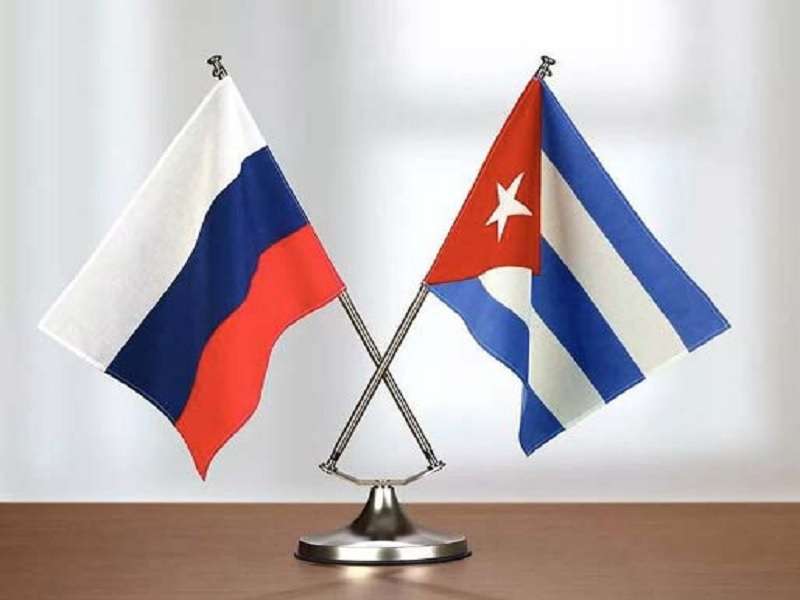
Russian and Cuban table size flags. Photo: EEASTI EESTI!/File photo.

Orinoco Tribune – News and opinion pieces about Venezuela and beyond
From Venezuela and made by Venezuelan Chavistas

Russian and Cuban table size flags. Photo: EEASTI EESTI!/File photo.
By Andrew Korybko – Sep 6, 2023
Few could have foreseen the Cuban Foreign Ministry’s recent announcement that it neutralized an alleged Russian network that was supposedly recruiting its citizens in both countries as mercenaries. The full text will be shared below for the reader’s convenience prior to analyzing it:
“Cuba counters human trafficking operations aimed for military recruitment purposes.
The Ministry of the Interior has detected and it is working to neutralize and dismantle a human trafficking network that operates from Russia in order to incorporate Cuban citizens living there and even some living in Cuba, into the military forces that participate in military operations in Ukraine.
Attempts of this nature have been neutralized and criminal proceedings have been initiated against those involved in these activities.
Cuba’s enemies are promoting distorted information that seeks to tarnish the country’s image and present it as an accomplice to these actions that we firmly reject.
Cuba Takes Position on Ukraine Conflict: ‘Russia Has the Right to Defend Itself’
Cuba has a firm and clear historical position against mercenarism, and it plays an active role in the United Nations in rejection of the aforementioned practice, being the author of several of the initiatives approved in that forum.
Cuba is not part of the war in Ukraine. It is acting and it will firmly act against those who within the national territory participate in any form of human trafficking for mercenarism or recruitment purposes so that Cuban citizens may raise weapons against any country.”
Cuba is obviously quite angry with what it alleges took place, but importantly, no blame was placed on the Russian state itself. Moreover, Havana also didn’t send any signal that it plans to change its UNGA stance towards the NATO-Russian proxy war in Ukraine.
It can’t be known for sure, but there’s a chance that this allegedly Russian-based network was run by non-state actors like those from the now-defunct Wagner group. The state has enough volunteers that it doesn’t need to recruit abroad, let alone behind its strategic partners’ backs by trying to convince their citizens to join its special operation. By contrast, Wagner’s late chief Yevgeny Prigozhin previously said that his group lost a lot of fighters around Artyomovsk, so it might have been desperate for recruits.
Furthermore, although Wagner as a whole had more or less come under the state’s control following his failed mutiny in late June, it can’t be ruled out that some dissatisfied elements went rogue by trying to recruit citizens from Russia’s strategic partners like Cuba as an asymmetrical form of revenge. These are crucial points to keep in mind so as to prevent hostile forces from exploiting this press statement for dividing-and-ruling these two multipolar countries.
In fact, it was precisely because of such information warfare efforts that Cuba felt compelled to publicly announce that it dismantled this alleged network in order to counteract false claims that the state was letting its citizens join this conflict, perhaps as part of some speculative quid pro quo with Moscow. That explains why the press statement explicitly condemned its enemies’ “distorted information” and strongly reaffirmed the state’s “firm and clear historical position against mercenarism”.
Had it not been for hostile forces circulating associated reports, Cuba might have only expressed its anger about this behind the scenes in order to avoid giving its enemies any narrative ammunition. Since its truly neutral reputation towards the conflict was impugned as a result, however, Havana had no choice but to clarify matters in all respects. This accounts for why it repeated its well-known UNGA position that’s taken the form of either abstaining or voting against anti-Russian resolutions.
All things considered, it’s certainly regrettable that an allegedly Russian-based network was recruiting Cubans in both countries as mercenaries for the special operation, but this incident isn’t expected to harm bilateral ties at the state level. As was argued, it could very well be that the now-defunct Wagner group was responsible for this, but that of course can’t be known for sure. In any case, those two’s supporters must resist efforts by hostile forces to exploit this scandal for divide-and-rule purposes.

Andrew Korybko is an American Moscow-based political analyst specializing in the relationship between the US strategy in Afro-Eurasia, China’s One Belt One Road global vision of New Silk Road connectivity, and Hybrid Warfare. He is a frequent contributor to Global Research.